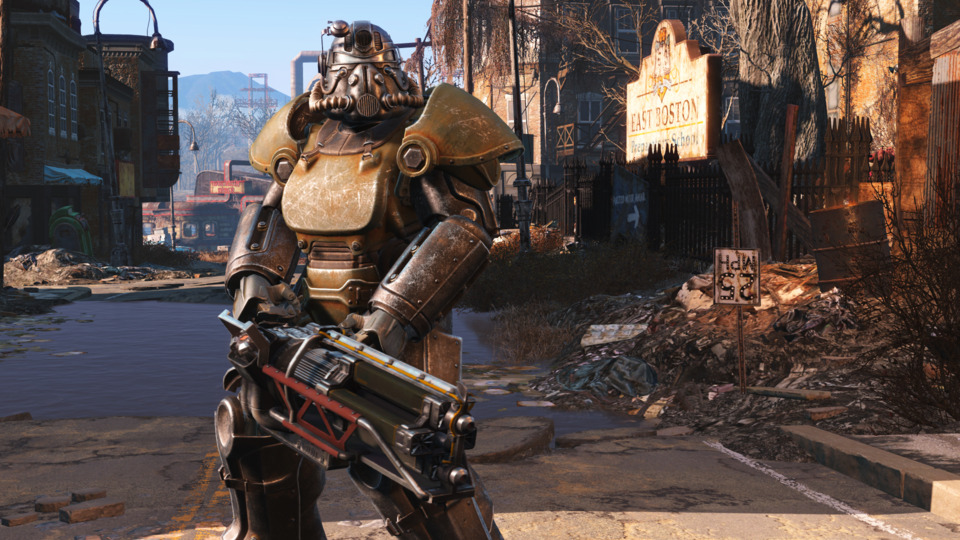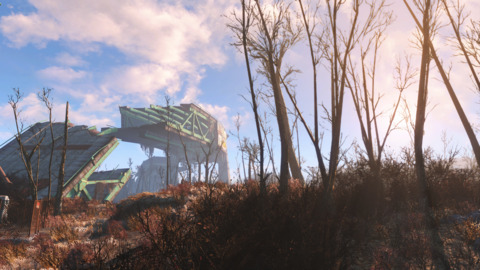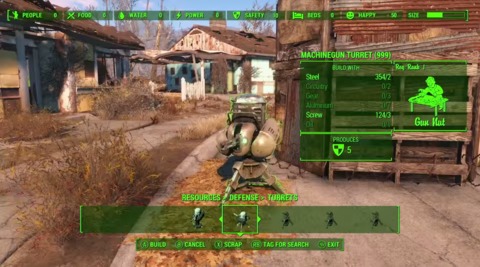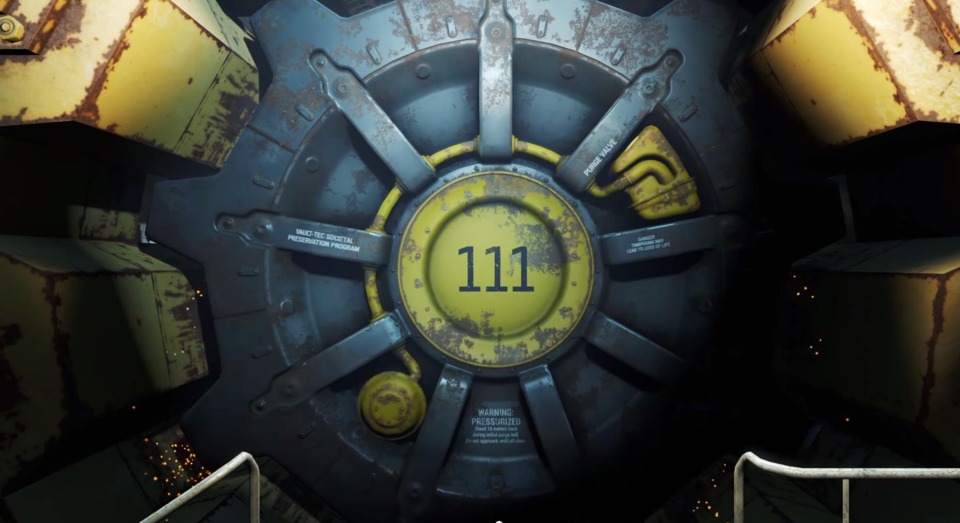Editor's note: The above score applies to the PS4 and Xbox One versions of the game. Due to performance issues specific to the console versions of the game, the PC version has been given four stars out of five. To see that score (note that the text is identical across both versions of the review), click here.

Buggy, yet beautiful. Occasionally broken, but robust in a way that few games attempt, let alone achieve. This has always been the push and pull of Bethesda's action/adventure/role-playing games. On the previous batch of consoles, it felt easier to work past the technical glitches--on some level, it was just impressive that games of that size and scope could even run on an Xbox 360 to begin with. But with each release, the "fun" of watching the games glitch out and behave in maddening and/or hilarious ways became a little less thrilling. At some point, I just want the games to work reliably. Fallout 4 follows in the footsteps of its predecessors, which is to say that it's a large, sprawling world filled with so many different quests and locations that most players will miss entire subplots as they scavenge their way from one side of the world to the other. That's also to say that it's occasionally kind of broken, from performance issues specific to the console versions to scripting glitches that might just prevent you from progressing to the same sort of "physics gone wild" moments that make for killer animated gifs and such. There's a great game in Fallout 4, but how much of that greatness gets through to you is largely dependent on your own tolerance levels for those glitches and how willing you are to play another game from the same template as Skyrim, Fallout: New Vegas, Fallout 3, and Oblivion.
I liked every one of those games quite a lot, but I will say that I was a little disappointed with how closely Fallout 4 sticks to that formula of factions, exploration, and points of no return that you cross as the factions are inevitably pitted against each other and the story winds down. Here, though, you get to explore a brief, pre-war prologue and see a little bit of what life was like before the bombs fell, turning your Boston-area suburb into yet another super mutant-filled wasteland. You play a created character who entered a Vault-Tec vault devoted to cryogenic experimentation just before the nuclear apocalypse, so you spent the next 200 years on ice... except for one key moment, where some dirtbag and his scientist buddies thaw you all out to steal your infant son out of the arms of your spouse, murdering said spouse in the process, and putting you back to sleep. You wake up, unsure of how much time has passed, but focused on finding the kidnapper and getting your son back.
Having a pre-war player character here is a cool idea that maybe doesn't get played up as much as it could have. As you're presented with things that any Fallout player would simply recognize as the current state of the world, the hero largely accepts everything without batting an eyelash. Every creature, from deathclaws to radroaches, is simply taken at face value, and the game's annoyingly generalized dialogue system rarely gives you the opportunity to express any incredulity at the state of this "modern" world. Actually, the dialogue system, which now just gives you vague ideas of what your character might say, failed me more than a few times by serving up lines that, tonally, didn't fit with what I was expecting. I'd rather just see the full text of the responses and not be surprised or forced to reload when the outcome is poor.

Anyway, after your kid gets kidnapped you're released into the open world. From there, the first thing the game does is point you at your first quest and introduce you to the workshop and base building mechanics. It never quite makes clear why you'd want to build a base at all, but you can slap down structures, walls, turrets, sources of food and water, and beds to keep existing settlers happy. If you want more settlers in a base, you can build a generator and a radio beacon that attracts people to the base. Then you'll need to plop down more beds and make sure they have enough food and water. Theoretically, making your bases more attractive will also make them more susceptible to attack, but other than fast traveling into a base and discovering a few super mutants hanging around once or twice, this didn't seem to happen that often.
More frequently, the bases you unlock and populate across the map will gin up combat missions for you like "go kill all the raiders/ghouls who are in this location." I was usually happy to help, but these definitely didn't make me feel compelled to build up and establish bases around the map. Even after finishing the game, I never really figured out why all that base-building stuff is in there. It feels pretty aimless, though I did end up enjoying cleaning up a lot of the scrap around my initial base and being able to store your crap in your workshop means you can loot the world (within reason, encumbrance is still a limiting factor) and not have to stash all your things inside some dead body or random toolbox. Though, of course, you can still do that if you're feeling "old school."
Exploring the Boston-based wasteland ended up being my favorite part of Fallout 4. The surrounding areas are full of apocalyptic wilderness, complete with mutant dogs, giant scorpions, bands of roving raiders, and, really, the same sorts of enemies you've seen in previous games. Rummaging around the wastes and turning up old military bunkers, big radio antennas, satellite arrays that have been overrun by hulking super mutants, and so on ended up being the most enjoyable time I spent with the game. Venturing into the city itself is exciting, too, both because the areas of interest are packing in more densely and because the combat situations get way more frequent and hectic inside the city limits. I continually found myself getting run out of town by various packs of scavengers, raiders, and, eventually, the Institute's murderous synthetic humans, or synths. The fake MIT, spun out across hundreds of years underground, is one of the big boogeymen in the story, and large parts of it deal with that age-old question, "do sentient robots deserve the same rights as humans?"

You can go a few different directions with that over the course of the game, but much like Fallout 3, I found that the way I wanted things to go at the end of the game wasn't even presented as an option, and the writing eventually pares things down into yes/no questions that feel too simple for what becomes a pretty complicated situation along the way. It's frustrating that there wasn't a little more nuance to things, though the weird thing about Fallout and its multiple endings is that I now feel like I need to go back to my hard saves at the different crossroad moments, where you cut ties with one faction to side with another, just to see if any of the other endings contain anything close to an attempt to how I would have resolved things if I wasn't just faced with a series of canned dialogue options. I suppose, on some level, it's a triumph that the game was able to get me thinking about these solutions at all. So many games fail to inspire even that.
There are main quest lines, faction quests, and some side quest lines, and with the exception of the "just go kill these dudes" quests I got from my settlements, I found that most of the quests were worth doing. Tracking down a missing Brotherhood of Steel squad had me trudging all around the east side of the map, finding one fallen soldier after another, each with an audio log pointing me in the direction of the next distress signal until it culminated in something a little more worth seeing. You'll find wild-eyed fans of the past who ask you to take on the role of a pre-war radio drama superhero, complete with trench coat and gleaming silver machine gun. You'll investigate the old memories of dead men, you'll find other Vault-Tec vaults and determine what nightmarish social experiment those Vault-Tec assholes unleashed on each particular vault. Most of these things feel worth doing and are, really, pretty engaging, even if the writing isn't always perfect. Even some of your companions can serve up some loyalty quests. My favorite character in the game ended up being Nick Valentine, a synth who makes his way as a hard-boiled detective type. Having his crime drama insight pop up as I made my way around the world was fun and occasionally funny. Him being a synth also ties him into some of the game's more central events.
The shooting's better and the slow-motion auto-aiming V.A.T.S. system isn't quite as necessary as it has been in previous Fallout games, though it's also been a balanced a bit to feel a bit less like a "murder everyone" button, too. Looting things from chests is a faster process, but overall, inventory and equipment management is kind of a hassle. You can favorite items, which makes them easily accessible from your D-pad, but doing things like comparing items against each other or swapping out your armor is an unfortunate challenge. The armor just sorts into a big list of everything, rather than neatly telling you "oh, here's all your left leg armor" and so on. Since ammo is a constant concern, I found myself carrying seven or eight guns for much of the game, to account for all the different types of bullets you might find out there. Ultimately, the 10mm pistol you get at the beginning of the game is still viable at the very end, as long as you perform a few upgrades along the way.

So, when everything is working as it should, Fallout 4 is a great game. But the frequency with which the game starts flipping out in ways both small and large is a big disappointment. Many of these issues have appeared in previous Bethesda games. I've had random AI characters run up against me while I was mid-conversation, breaking me out of the conversation and forcing me to restart the dialogue. Guys will still photobomb your dialogue by walking into frame and shouting whatever their "hey, I'm standing near the player character, I should act alive" sentence may be. Sometimes the camera will be completely pointed at the wrong thing during dialogue. I got to a pivotal moment in the story and got to talk to a big bad guy while he stood completely out of frame due to a nearby desk blocking the shot. The lip sync rarely looks great. And we're still just talking about things that might happen while you're in a dialogue with another character.
In the workshop mode, plopping objects down on slopes and slants means that you might see half of your structures just floating in mid-air. Companions like to block doorways, making it a hassle to move around tight spaces. I had my dog companion walk up the side of a wall and kind of just float in mid-air. Sometimes I'd turn around and find that half of Nick's body was just sort of stuck in a wall or floor. Dismissing a companion lets you give them a location to return to, in case you need them later. Once I dismissed my dog, I never saw him again. Is he still roaming around Sanctuary Hills? He's certainly supposed to be. Doors sometimes act weird, making them tricky to get through. I wasted around an hour trying to activate a quest objective and the game simply refused to budge. After quitting the game, relaunching a few times, fast traveling away and back into the area, and sacrificing my first-born, it eventually worked. I still don't understand why it started working. Things like this can make for fun complication videos, but it also shook my faith in the entire game. I eventually became afraid to try some of the weirder things in the game, fearing that it'd break a quest and prevent me from moving forward. That's a bad place to be with a game that's supposed to offer so much freedom.

The different platforms add some unique challenges, as well. The PC version is the clear victor here, with somewhat reasonable system requirements, console command access for weird cheats and mods, and a smooth frame rate. However, the game's mouse and keyboard controls aren't great. The console versions have it much worse on the frame rate end of things. This goes beyond the normal variances and starts impacting gameplay, because it turns out that it's damned hard to aim a gun when the game is running as poorly as it sometimes does. It seems to act worse in indoor areas, and some people are reporting better results on the Xbox One if you install it to an external drive (something I tend to recommend across the board, if you're able). Late-game combat situations where you're facing a dozen or so angry, armed enemies in a tight space turn the game into a slide show. And since things still move in slow-motion when you activate V.A.T.S., it's not a great way to circumvent the console versions' poor performance. I'd go so far as to say that this game becomes a tougher sell if you're intending to play it on PS4 or Xbox One.
But the glitchy technical issues appear across the board in every version of the game. In that, Fallout 4 is universal. As such, a big part of deciding if you want to play Fallout 4 becomes a personal inventory of your desire to either revel in these glitches or your patience at dealing with them, should they appear. As someone who has really appreciated this line of games in both its Fallout and Elder Scrolls flavors, Fallout 4 was still harder to swallow than I initially suspected it would be. It's another one of those games, for better and for worse.